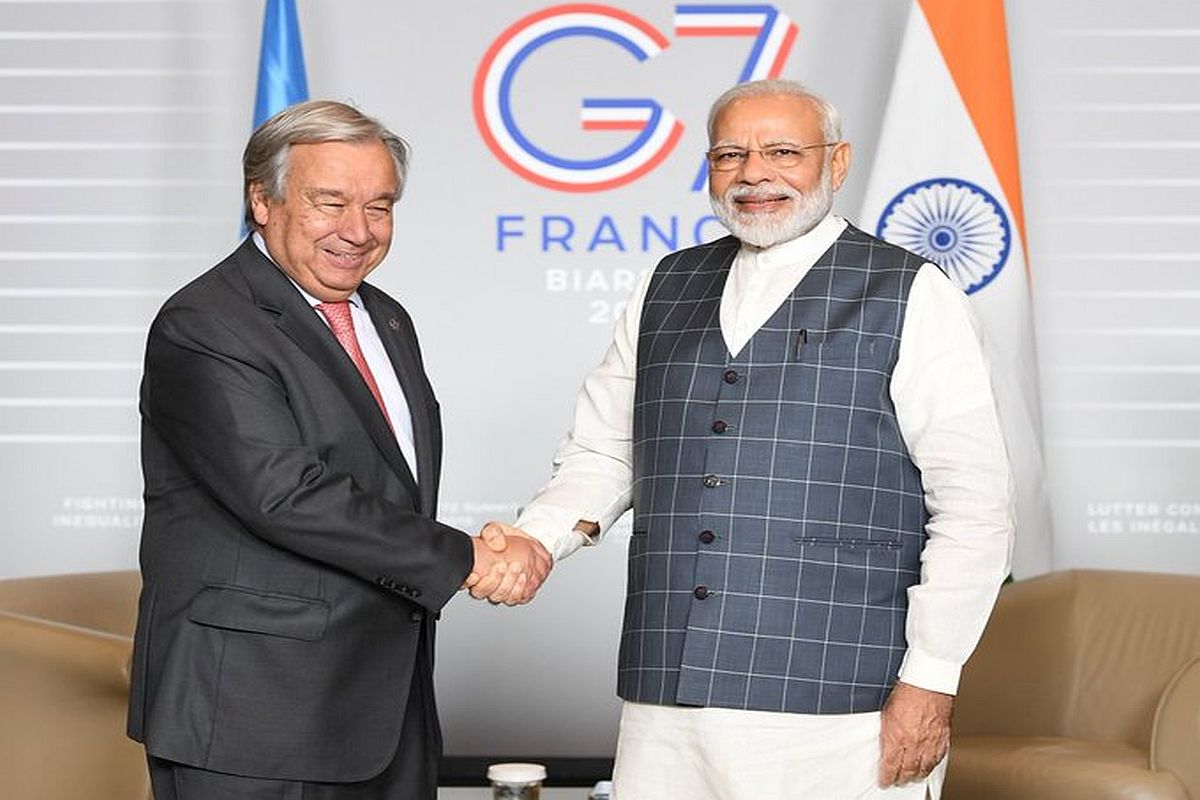Assam’s grand Jhumoir show: 8,000 performers, PM Modi to attend
Assam’s Jhumoir Binandini event on February 24 will feature over 8,000 performers showcasing the traditional Jhumoir dance at Sarusajai Stadium, Guwahati.
The UN chief’s comments come at a time when Pakistan has been making efforts to internationalise the Kashmir issue – first at the UNSC last month and then again at the UNHRC on Tuesday.

Prime Minister Narendra Modi meets United Nations Secretary-General Antonio Guterres on the sidelines of G7 Summit in Biarritz in France. (File Photo: Twitter | @PMOIndia)
In a statement that can be construed as a huge boost for India, United Nations (UN) Secretary-General Antonio Guterres on Wednesday appealed to both New Delhi and Islamabad to resolve the Kashmir issue via bilateral dialogue.
The UN chief’s comments come at a time when Pakistan has been making efforts to internationalise the issue – first at the United Nations Security Council last month and then again at the UN Human Rights Council (UNHRC) on Tuesday.
Advertisement
Spokesperson for UN Secretary-General Stéphane Dujarric said the UN’s position on mediation has always remained the same.
Advertisement
The spokesperson further said that the UN Secretary-General is very concerned about any potential escalation between the two countries over Kashmir.
Guterres had met Prime Minister Narendra Modi on the sidelines of the G7 Summit last month in Biarritz in France and had also spoken to Pakistan’s Foreign Minister Shah Mahmood Qureshi.
Guterres on Monday also met the Permanent Representative of Pakistan to the UN, Maleeha Lodhi, on her request over the Kashmir issue.
The position of the United Nations on the Kashmir region is governed by the Charter of the United Nations and applicable Security Council resolutions.
The provisions of the Charter require the concerned members to settle their disputes by peaceful means and to refrain from the threat or use of force against the territorial integrity of any nation.
The Charter also says that the UN cannot “intervene in matters which are essentially within the domestic jurisdiction of any state”.
Under the 1972 Simla Agreement, India has maintained that it will not have a third party involvement in the Kashmir issue, which it sees as a bilateral matter with Pakistan.
Guterres had earlier last month recalled the 1972 Simla Agreement between India and Pakistan, which states that the final status of Jammu and Kashmir is to be settled by peaceful means, in accordance with the Charter of the United Nations.
Pakistan had on Tuesday raked up the issue at the UN Human Rights Council after failing to garner support even from its staunch allies on J-K.
Pakistan has been desperate since the Centre decided to abolish the special status of Jammu and Kashmir granted under Article 370 of the Constitution and bifurcated the state on August 5.
In his address at the UNHRC session, Pakistan Foreign Minister Shah Mehmood Qureshi had said that Jammu and Kashmir had been converted into the “largest prison” with people being denied access to basic amenities following the abrogation of Article 370.
Pakistan further asked the Council to conduct an international investigation, urging the world rights body not to remain “indifferent” over India’s move on Kashmir.
However, the Indian delegation led by Secretary (East) in the Ministry of External Affairs Vijay Thakur Singh, effectively rebutted Pakistan’s allegations on human rights violations in Kashmir.
India said there was a need to call out those who are “misusing” the United Nations Human Rights Council platform for “malicious political agenda under the garb of human rights.”
In a strong rebuttal, India said: “This fabricated narrative comes from the epicentre of global terrorism, where ringleaders were sheltered for years.”
India also drew global attention to Pakistan’s persecution and elimination of religious and ethnic minorities.
Pakistan had knocked the doors of the UNHRC after it failed to gain global attention on Kashmir issue at the UNSC.
The rare closed-door consultations on Kashmir by the UN Security Council ended without any outcome or statement from the powerful 15-nation UN organ, dealing a huge snub to Pakistan and its all-weather ally China to internationalise the issue, which an overwhelming majority stressed is a bilateral matter between New Delhi and Islamabad.
Majority of the 15 members said there should not be any statement or outcome issued after the consultations and their will prevailed, leaving China to come out and make a statement in its national capacity followed by Pakistan.
Advertisement